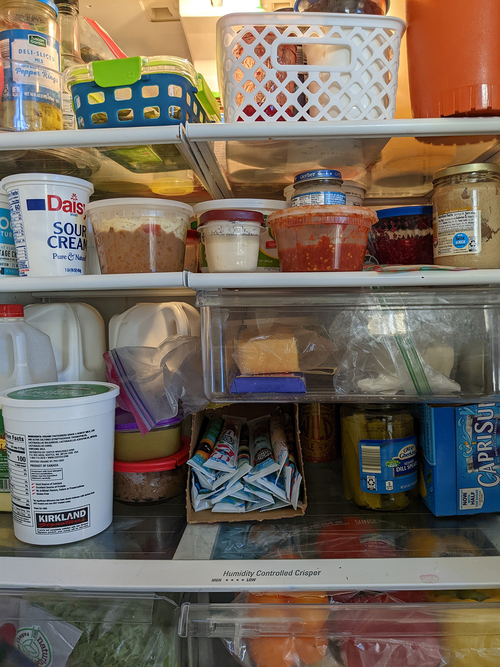Playing turkey day Tetris again this year? Consider charity on Tuesday

“Oh, man. Where am I supposed to put all this milk?”
That was me last week, having returned from a trip to the madhouse that is the Sioux Falls Costco on a Saturday with two gallons of a staple beverage my wife had restocked the day before.
I cursed my failure to investigate the fridge’s inventory before the trip. I cursed the smallness of the appliance, although it seems smallest on days when we double up on milk purchases. I cursed our leftovers, our swelling collection of rarely used condiments, and the children who swore off juice boxes after consuming just two of them from the 12-pack now hoarding space in the overstuffed cooling unit.
I cursed our prosperity, more or less.
Reading or hearing thousands of words in the days since about turkey pardons and turkey shortages and turkey inflation put that reality into stark focus.
On the one day of the year that overfull fridges are more likely than not in kitchens all across the country, it’s important to remember just how lucky we are to have such a complaint.

My family didn’t grow up with little or nothing, but we grew up with far less than I have now. My father’s father was a Centerville-area farmer; my mother’s father collected trash. Both of my grandmothers worked in hospitals or picked up other odd jobs. My dad worked in a warehouse for the power company in Huron; my mom ran a daycare, then worked in school district kitchens, in part so she could be home when her kids got there.
My wife, a Clear Lake native, came from similarly modest means. Like me, she grew up to be a writer who collects larger paychecks than her parents ever did.
Perhaps that’s why we both jump at the chance to pick up a few gallons of cheap milk, or why we shudder at the demand-driven $375 weekly price tag now attached to daycare for infants in a city where in-home daycares are closing as the population rises.
We don’t want to pay that much for our 6-month-old, but we wouldn’t go hungry if we had to.
For my family, a $375 weekly infant care bill would force a change to our spending habits. For a wider swath of South Dakotans, it would force a much harder choice: Can I afford to work at all?
That she and our three children are blessed with that kind of abundance from jobs that lack the backbreaking physical demands of our parents’ labor is a measure of how lucky we’ve been. Today is the day for thinking such thoughts. Thanksgiving is our national hour of collective gratitude, during which people like me write columns like this and the rest of us are encouraged to express our thankfulness in a manner reflective of our own circumstances.
It’s also the holiday when people like me remind readers like you that circumstances aren’t quite so rosy for many of us. For my family, a $375 weekly infant care bill would force a change to our spending habits. For a wider swath of South Dakotans, it would force a much harder choice: Can I afford to work at all?
The childcare situation in South Dakota has been described as a crisis by a host of authorities across the state, and while there have been efforts to address it, many feel that the issue hasn’t been taken seriously. Gov. Kristi Noem pushed to use federal dollars for child care spending during the last legislative session. In Sioux Falls, a group of childcare advocates is working to identify potential solutions, many of which we plan to explore in our South Dakota Searchlight coverage.
Sioux Falls Mayor Paul Tenhaken likes to frame the issue in terms of a workforce crisis. If you can’t afford childcare, basically, you’re not going to work. That’s an issue in a city with a labor shortage that’s driving up wages to attract workers but struggles with the same inflationary pressures as the rest of the country.
Child care prices are higher. Gas prices are higher. Housing costs are rising. Health care costs have been more than many can afford for decades, which is almost certainly a major factor in South Dakota’s vote to expand Medicaid on Election Day.
The opportunity to write and share stories about the government policies that affect people in those situations is one of the reasons I chose this profession. If it’s hard to find child care or work that pays well enough to get it, it’s even harder to keep track of the decisions made by elected officials that might make it easier (or harder) to deal with such problems.
Decisions like where to put $200 million to encourage the construction of affordable housing in rural South Dakota, where to invest in rural broadband to boost business prospects or how to keep rural emergency medical services afloat.
Then there’s the issue of those who struggle the most: those without a permanent home.
Which brings us back to gratitude. In our house, we do our best to teach our kids how important it is to give back what we can. My wife’s side of the family will once again forego in-law gift-giving next month to donate to local charities, for example, and we tied our eldest’s allowance to a “spend, share, and save” budget scheme (the littles are too little to trust with chores just yet).
Giving Tuesday has become the focus of such efforts in recent years, and I’m sure at least a few of you intend to make donations to the local organizations that work to help those in need this year. There are more than enough to choose from.
We here at South Dakota Searchlight would be thrilled if you chose to devote a portion of your charity budget to the work of our nonprofit newsroom this year – a newsroom whose coverage is available to read on our site or to be published by any news organization at no cost.
It certainly doesn’t need to be us. My hope is that those of us who see Thanksgiving as the setup for another game of Tetris in an overstocked fridge will consider devoting the resources we can to the causes you care about most.
If those resources help those who see the turkey day rush of leftovers as a few days’ respite from questions about where their next meal will come from, you won’t hear any complaints from me.








